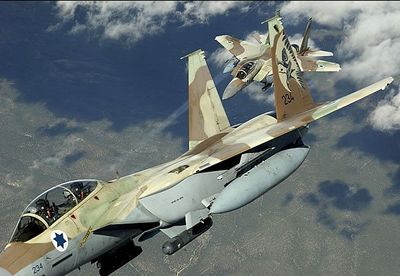An Israeli air strike hit a military research centre near Damascus at dawn on Wednesday, the Syrian army said, denying reports that the raid targeted a weapons convoy near the Lebanese border.
Residents who spoke to AFP on condition of anonymity, however, said the strike targeted a non-conventional weapons research centre some 15 kilometres (10 miles) northwest of the Syrian capital.
“Israeli fighter jets violated our airspace at dawn today and carried out a direct strike on a scientific research center in charge of raising our level of resistance and self-defence,” Syria’s army said.
The raid came “after terrorist groups made several failed attempts in the past months to take control of the site,” its general command said, referring to rebels fighting to oust President Bashar al-Assad’s regime.
The warplanes entered Syrian airspace via Mount Hermon, or Jabal el-Sheikh in Arabic, at low altitude and under the radar, the army said in the statement carried by state media.
“They… carried out an act of aggression, bombarding the site, causing large-scale material damage and destroying the building,” state television quoted the military as saying.
Two site workers were killed in the strike, said the army, while denying reports Israel had launched a strike overnight on a weapons convoy near Lebanon.
Residents told AFP that six rockets hit the complex, leaving it partially destroyed, causing a fire and killing two people.
The attack came after Israel expressed concerns that Damascus’s stockpile of chemical weapons could fall into the hands of Lebanon’s Shiite Hezbollah group, an ally of Assad’s regime, or other militant organizations.
Israel, whose officials have said such that a transfer would be a casus belli and likely spark an attack, refused to comment on the attack.
The United States, which is currently hosting Israeli military intelligence chief Aviv Kochavi, also declined to comment.
As well as concerns about Syria’s chemical weapons stockpile, Israel has accused Syria of supplying long-range Scud missiles to Hezbollah.
It has also warned about the dangers of other advanced weaponry falling into the Lebanese militia’s hands, such as anti-aircraft systems and surface-to-surface missiles.
Ahead of the strike, several sources reported a high level of “unusual” Israeli activity over Lebanese airspace, since Tuesday evening.
The Lebanese army said Israeli warplanes had entered Lebanese airspace up to 16 times between 9:30 am (0730 GMT) on Tuesday and 2:00am on Wednesday.
“Every day there are Israeli overflights, but on Tuesday they were much more intense than usual,” a Lebanese security source told AFP on condition of anonymity.
The attack took place just days after Israel moved two batteries of its vaunted Iron Dome missile defence system to the north and at a time of rising fears that the Syria conflict could see chemical weapons leaking into Lebanon.
A former intelligence chief with Israel’s Mossad spy service said the Jewish state “should make any effort to prevent any weapons systems of that kind going out to terror organizations.”
In comments before reports of the attack emerged, Amnon Sofrin said Israel was unlikely to hit chemical weapons stocks from the air because of the environmental risks.
“When you go and attack a… chemical weapons depot, you’re going to do unwarranted damage because every part will leak out and can cause damage to many residents.
“But if you know of a convoy leading these kind of weapon systems from Syria to Lebanon, you can send a unit to the proper place and try to halt it” on the ground, he said.
On Monday, Israel’s Maariv newspaper said that Prime Minister Benjamin Netanyahu had “urgently dispatched” his National Security Adviser Yaakov Amidror to Moscow to ask Russia to use its influence in Syria to prevent the transfer of chemical weapons.










